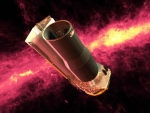Displaying items by tag: Spitzer
Spitzer Space Telescope
The Spitzer Space Telescope, formerly named as the Space Infrared Telescope Facility (SIRTF), is an infrared space observatory launched in 2003. It is the fourth and final of the NASA Great Observatories program.
The planned mission period was to be 2.5 years with a pre-launch expectation that the mission could extend to five or slightly more years until the onboard liquid helium supply was exhausted. This occurred on 15 May 2009. Without liquid helium to cool the telescope to the very cold temperatures needed to operate, most instruments are no longer usable. However, the two shortest wavelength modules of the IRAC camera are still operable with the same sensitivity as before thecryogen was exhausted, and will continue to be used in the Spitzer Warm Mission.
It follows a rather unusual orbit, heliocentric instead of geocentric, trailing and drifting away from Earth's orbit at approximately 0.1 astronomical unit per year (a so-called "earth-trailing" orbit). The primary mirror is 85 centimetres (33 in) in diameter, f/12 and made of beryllium and was cooled to 5.5 K (−449.77 °F). The satellite contains three instruments that allowed it to perform astronomical imaging and photometry from 3 to 180 micrometers, spectroscopy from 5 to 40 micrometers, and spectrophotometry from 5 to 100 micrometers.

